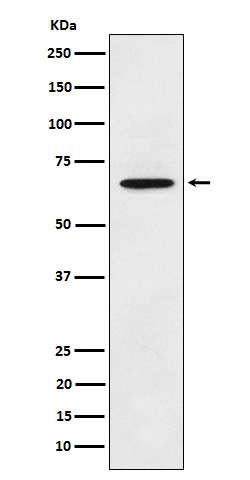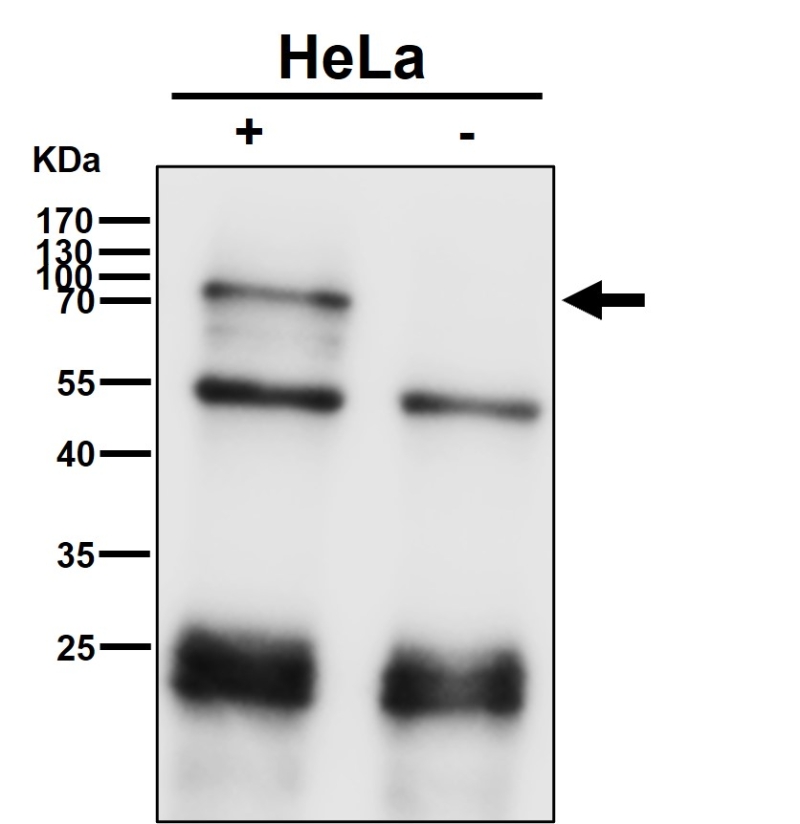

| WB | 咨询技术 | Human,Mouse,Rat |
| IF | 1/20-1/50 | Human,Mouse,Rat |
| IHC | IHC:1/100-1/200;IHF:1/50-1/200 | Human,Mouse,Rat |
| ICC | 1/50-1/200 | Human,Mouse,Rat |
| FCM | 1/20-1/100 | Human,Mouse,Rat |
| Elisa | 咨询技术 | Human,Mouse,Rat |
| Aliases | Ecm1; URBWD;;Extracellular matrix protein 1 |
| WB Predicted band size | Calculated MW: 61 kDa ; Observed MW: 70 kDa |
| Host/Isotype | Rabbit IgG |
| Antibody Type | Primary antibody |
| Storage | Store at 4°C short term. Aliquot and store at -20°C long term. Avoid freeze/thaw cycles. |
| Species Reactivity | Human,Rat |
| Immunogen | A synthesized peptide derived from human Extracellular matrix protein 1 |
| Formulation | Purified antibody in PBS with 0.05% sodium azide,0.05% BSA and 50% glycerol. |
+ +
以下是关于ECM1抗体的3篇参考文献的简要信息,涵盖其在疾病诊断、治疗和机制研究中的应用:
---
1. **文献名称**: *ECM1 Antibody-Based Detection of Tumor Microenvironment Remodeling in Breast Cancer*
**作者**: Zhang Y, et al.
**摘要**: 该研究开发了一种特异性识别ECM1的单克隆抗体,用于评估乳腺癌微环境中ECM1的表达水平,发现其高表达与肿瘤转移和不良预后显著相关,提示ECM1可作为潜在诊断标志物。
---
2. **文献名称**: *Targeting ECM1 with Neutralizing Antibodies Suppresses Angiogenesis in Hepatocellular Carcinoma*
**作者**: Liu H, et al.
**摘要**: 研究团队通过体内实验证明,阻断ECM1的中和抗体可抑制肝癌血管生成,并降低VEGF信号通路活性,为ECM1靶向治疗提供了实验依据。
---
3. **文献名称**: *Autoantibodies Against ECM1 in Lichen Sclerosus: Pathogenic Role and Clinical Correlation*
**作者**: Wang X, et al.
**摘要**: 该文献发现硬化性苔藓患者血清中存在抗ECM1自身抗体,并通过细胞实验表明这些抗体可能通过破坏基底膜完整性参与疾病发生,提示ECM1抗体检测对自身免疫性皮肤病诊断的意义。
---
这些研究分别从肿瘤诊断、靶向治疗和自身免疫病机制的角度探讨了ECM1抗体的应用价值。如需具体文献来源,建议通过PubMed或Web of Science检索标题或作者以获取全文。
The extracellular matrix protein 1 (ECM1) is a secreted glycoprotein involved in tissue remodeling, angiogenesis, and cell differentiation. First identified in 1997. it is encoded by the *ECM1* gene, which generates multiple isoforms through alternative splicing. ECM1 interacts with various extracellular components, including proteoglycans, growth factors, and integrins, modulating signaling pathways such as Wnt/β-catenin and NF-κB. Its expression is critical in skin homeostasis, bone development, and tumor progression.
ECM1 antibodies are immunological tools developed to detect and study ECM1’s role in physiological and pathological contexts. Dysregulated ECM1 is linked to diseases like lipoid proteinosis (a rare autosomal recessive disorder), systemic sclerosis, and cancers (e.g., breast, liver, and ovarian). Overexpression in tumors correlates with metastasis, immune evasion, and poor prognosis, making ECM1 a potential diagnostic biomarker and therapeutic target.
Antibodies against ECM1 are utilized in techniques like immunohistochemistry, Western blotting, and ELISA to assess protein localization, expression levels, and interactions. Recent research also explores ECM1-targeting antibodies for therapeutic applications, including blocking tumor-promoting pathways or enhancing drug delivery. However, challenges remain in isoform-specific detection due to structural variations. Continued studies on ECM1 biology and antibody development could advance diagnostics and precision therapies for ECM1-associated diseases.
×